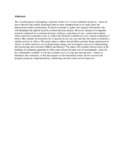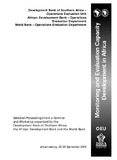| dc.description.abstract | The overall purpose of designing evaluation studies is to set up conditions and proce
-
dures for data collection that enable meaningful and accurate interpretations to be made
about the phenomenon under consideration. Evaluators attempt to gather and organize
information that will illuminate the options faced by societal decision-makers. However,
because of evaluation research conducted on evaluation practices in Kenya, experience
in east, central and southern Africa and local evaluation work, as well as the literature
available on cross-cultural evaluation, I believe that suitable environments for evaluation
do not yet exist and that this makes evaluation a sideline activity in Africa.
This paper aims to address the problem currently being experienced in Africa, of which
criteria to use in determining change, the investigative process or methodology, and
monitoring and evaluation (M&E) mechanisms. The paper will examine critical issues in
the building of evaluation capacities in Africa and will put forward a set of recommenda
-
tions for key stakeholders in M&E. It will also examine ways of using the relevant infor
-
mation to illuminate the evaluation, so that the progress of developmental trends can be
assessed and program proposals, implementations, monitoring and renovation can be
improved. | en |


